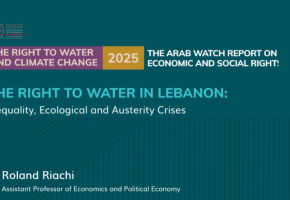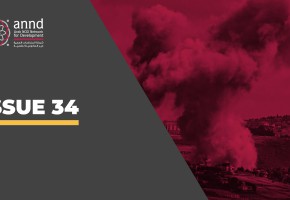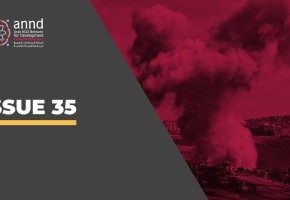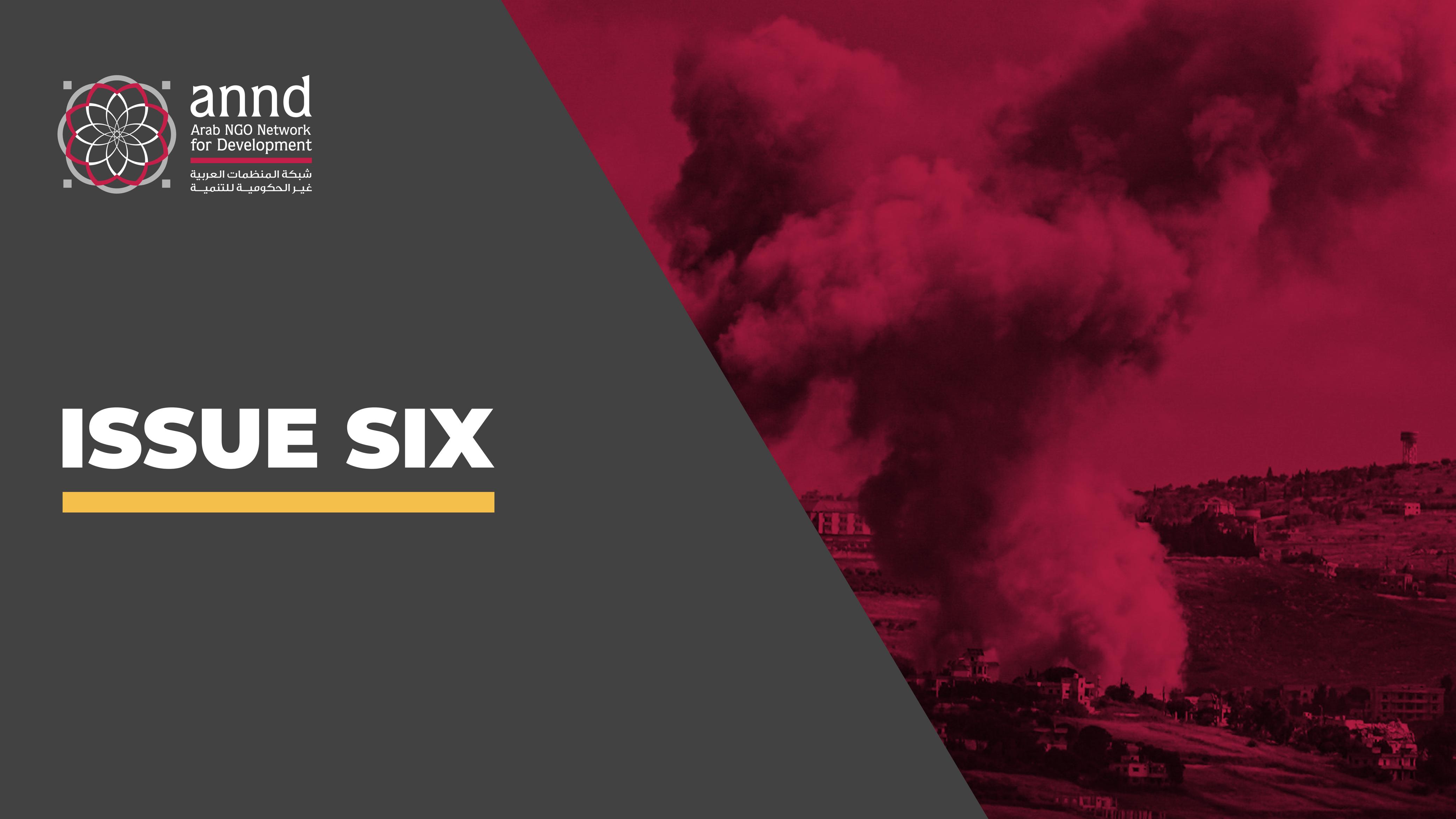
A Region on Fire
Issue Six - October 2, 2024
Will diplomatic efforts succeed in achieving a ceasefire?
On the 362nd day of the war on Gaza, heavy Israeli bombing from land, sea, and air continued across the besieged strip. In less than 24 hours, at least 193 Palestinians were martyred, and 652 others were injured, according to the Gaza Ministry of Health. This brings the total number of victims of the aggression to 41,689 martyrs and 96,625 injured since October 7 of last year.
Meanwhile, the exchange of fire continued in Lebanon between Hezbollah and Israel, where sirens were heard in most northern settlements, while Israel bombed many villages and towns in southern Lebanon, the Bekaa, and the southern suburbs of Beirut using internationally banned phosphorus bombs. Israeli media announced the killing of 10 soldiers and the injury of 67 others in clashes with Hezbollah fighters on the Lebanese border.
On the other hand, Iran warned that any response to the missile attack that targeted Israel yesterday would be met with harsher retaliation. This followed Benjamin Netanyahu's threats that Israel would respond forcefully to the Iranian missile attacks that targeted several sites.
At the international level, the UN Security Council held an emergency session on Wednesday to discuss developments in the Middle East and the war on Gaza and Lebanon. The session began publicly and was then closed for consultations among member states on a U.S. draft resolution regarding regional developments.
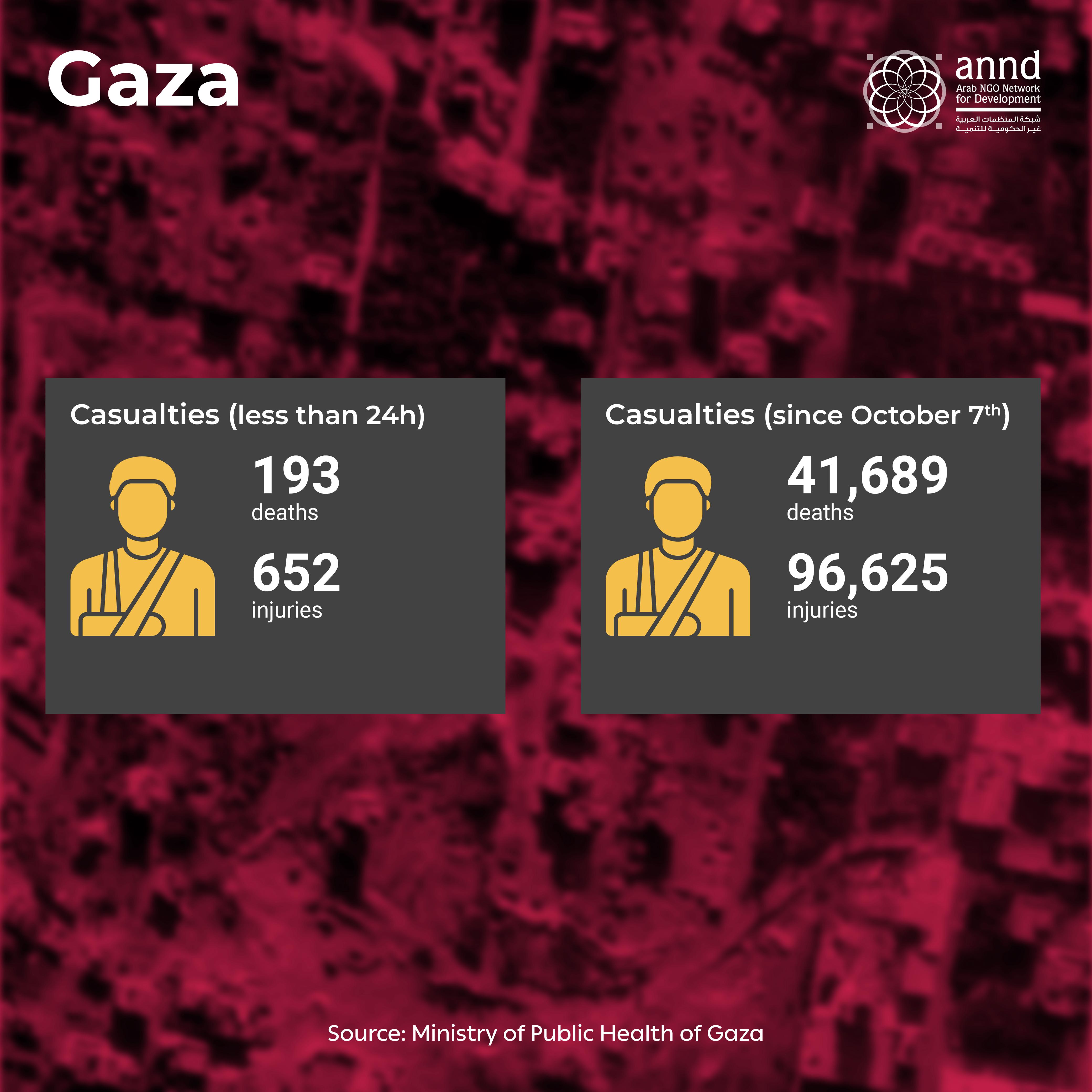
Lebanon: The Battlefield Situation
On Wednesday morning, the Israeli army launched successive air raids on the southern suburbs of Beirut after warning residents of several buildings to evacuate immediately, asking them to move at least 500 meters away. Afterward, nine Israeli airstrikes targeted various areas of the southern suburbs for two hours. The raids continued in other areas of the northern and western Bekaa, targeting villages, towns, and residential neighborhoods, causing significant damage and destruction to property.
Hezbollah announced early Wednesday morning concerning developments on the battlefield that its fighters had repelled Israeli ground forces attempting to infiltrate from three directions: Adaisseh, Aitaroun, and Maroun al-Ras, which are Lebanese towns. According to Hezbollah, they forced the Israeli forces to retreat after 30 Israelis were killed and 68 wounded.
The Israeli army announced on Wednesday the reinforcement of its military units, with the 36th Division joining the ground operation in southern Lebanon, including soldiers from the Golani Brigade, the 188th Armored Brigade, and the Atsyoni Brigade, among others. All these units are to take part in the concentrated and defined operation that began in southern Lebanon.
On the Israeli home front, however, air raid sirens continued to sound at an unprecedented pace across Israel as Hezbollah launched intensive rocket, drone, and artillery attacks targeting military sites and settlements, amid strict Israeli military censorship on human and material losses, according to observers.
The head of Israeli military intelligence and the commander of the northern corps predicted that the ground maneuvers in Lebanon could extend to Beirut or even beyond.
Shortly after midnight on Wednesday-Thursday, Israeli airstrikes resumed on Beirut’s southern suburbs, with Israeli planes carrying out 16 raids targeting residential neighborhoods. For the second time, Israeli warplanes targeted Beirut by striking the civil defense center of the Islamic Health Authority in a densely populated area (packed with residents and displaced persons), killing six paramedics and injuring seven civilians, some critically. The raids also hit areas in Hermel in northern Bekaa during the night.
By 12 a.m. Wednesday, the death toll reached 46, with 85 injured, bringing the total number of martyrs to 1,919 and the total number of injured to 9,219, according to a statement from the Ministry of Health.
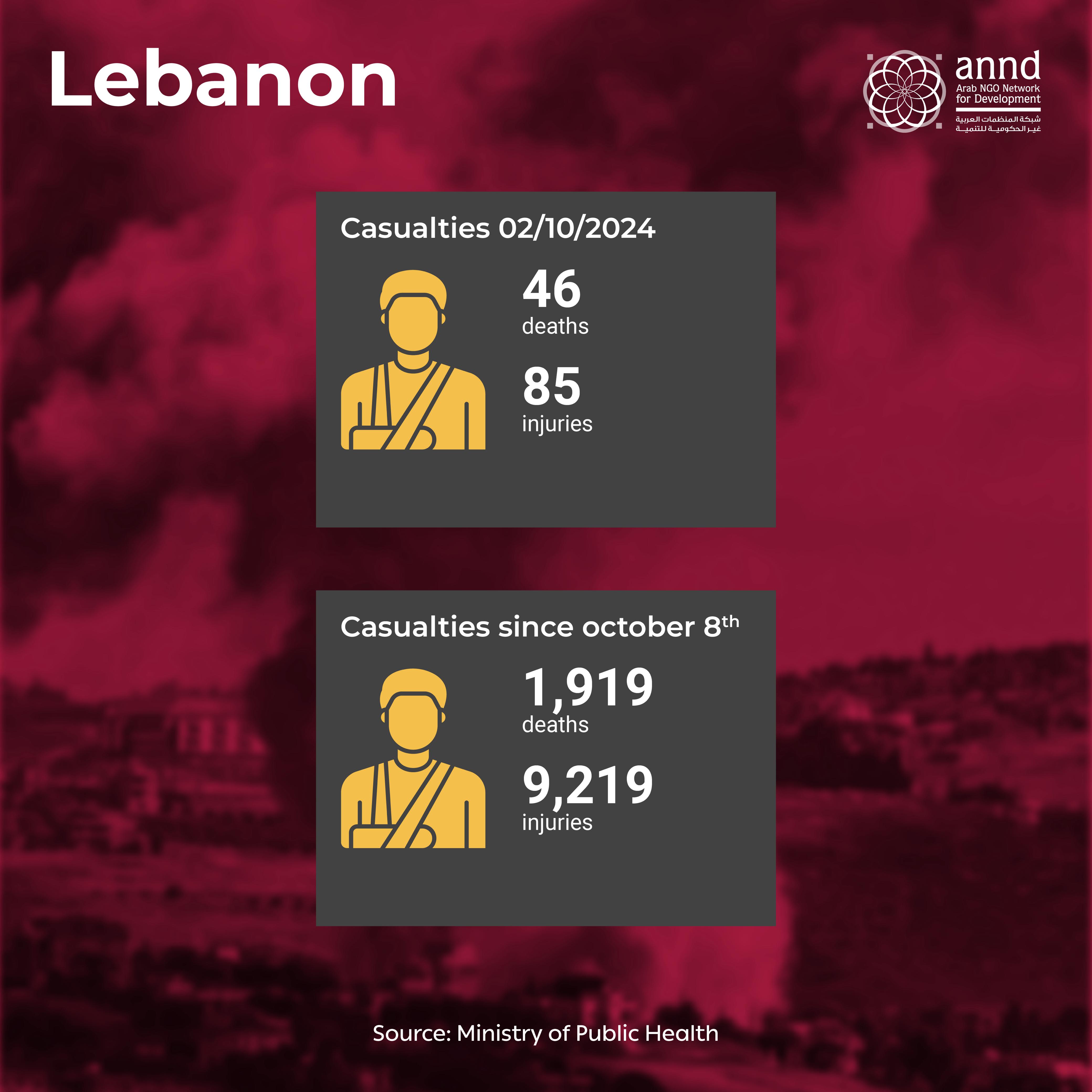
Regarding shelter and relief efforts for the displaced, Lebanese Prime Minister Najib Mikati announced that approximately 874 shelters had been established, with the number expected to increase. Statistics show that most of those sheltering on the streets are non-Lebanese, and the government is coordinating with the UNHCR to care for them in cooperation with the Ministry of Social Affairs. Mikati emphasized that it is unacceptable for people to have to remain on the streets, highlighting the need for more to be done.
He also announced that international organizations had approved immediate funding of $200 million out of the $427 million that Lebanon needs for the next three months. (The government had issued a joint appeal with the United Nations on Tuesday requesting urgent aid of $427 million.)
Lebanon: Political Developments
The Lebanese cabinet held a session and decided to cover insurance for Middle East Airlines to keep Beirut International Airport open. Prime Minister Najib Mikati announced after the session that he had tasked Army Commander Joseph Aoun with "taking whatever measures he deems necessary to protect Lebanon and the military institution" in light of the Israeli aggression.
On the diplomatic front, the prime minister affirmed Lebanon’s support for the appeal issued by the U.S. and France, backed by the European Union, the UK, Germany, Saudi Arabia, Qatar, Australia, Canada, the UAE, Italy, and Japan, regarding a ceasefire in Lebanon. He blamed Israel for continuing the war, accusing it of persistently violating UN Resolution 1701. Mikati also said he would coordinate with Foreign Minister Abdallah Bou Habib, who is in the U.S., to align Lebanon's position with the statement he would deliver at the UN Security Council meeting today.
After a meeting with the “Independent Parliamentary Consultative Gathering” with Speaker of Parliament Nabih Berri, it was stated that Berri no longer insisted on dialogue as a precondition for electing a president and affirmed his support for the ceasefire proposal put forth by the U.S. and France, based on implementing Resolution 1701. Hezbollah reportedly assigned Nabih Berri to negotiate on its behalf regarding the presidential vacancy. Sources confirmed that Hassan Nasrallah had agreed to the truce before his assassination in accordance with the U.S.-French initiative.
The Maronite Bishops' statement called on international organizations to support Lebanon's official efforts to mitigate the impact of displacement and urged the international community to shoulder its responsibility for an immediate ceasefire and to implement Resolution 1701. They also called for the reopening of Parliament to elect a president, as Lebanon stares down crucial and fateful events.
In a significant development, Prime Minister Najib Mikati stressed during a statement on Wednesday evening after meeting with Speaker Nabih Berri and former minister Walid Jumblatt that the Lebanese people must remain united in the face of the aggression and support efforts for a ceasefire, emphasizing the implementation of Resolution 1701 and deploying the Lebanese army to the south. Mikati also called for strengthening and equipping the Lebanese army to enable it to deploy in the south and protect the Lebanese borders, particularly in the south.
Before the Security Council: The UN calls for an end to the “vicious cycle” of escalation in the Middle East
The French Foreign Ministry called for an emergency session of the UN Security Council to discuss the situation in the Middle East on Wednesday afternoon. France had previously called on Israeli authorities to "immediately stop" their military operations and on Hezbollah to cease its terrorist activities against Israel and its population, while reiterating its commitment to Israel’s security and its right to self-defense.
UN Secretary-General António Guterres, in his address to the Security Council, said that "civilians are paying a heavy price," adding that Israel's military campaign in Gaza has been "the deadliest and most destructive in my years as Secretary-General." He stated that the October 7 attacks "did not come out of nowhere," as Gaza has endured 50 years of occupation, settlement construction, evictions, land seizures, and intensifying settler attacks, which have gradually undermined any possibility of a two-state solution. He added that while this does not justify Palestinian armed groups' resort to violence against civilians, it also does not justify Israel's attacks on civilians, emphasizing that wars must adhere to rules.
The Lebanese representative at the session stated that Israel’s barbaric aggression spared neither civilians, rescue workers, nor journalists, and dismissed claims of targeted operations as false, citing the destruction of an entire residential building in the village of Ain al-Dilb in eastern Sidon, where entire families were killed and buried under the rubble. He reiterated Prime Minister Mikati’s commitment to the call issued by the U.S. and French presidents and pledged to implement all the points mentioned, including an immediate ceasefire to begin discussions on fully implementing Security Council Resolution 1701 and deploying the Lebanese army to the south in cooperation with international peacekeeping forces. He warned that Lebanon is facing an unprecedented humanitarian crisis and urgently needs humanitarian aid.
Other representatives spoke, with the French envoy condemning military actions targeting civilians and calling for an immediate ceasefire while insisting on the implementation of Resolution 1701. The British representative expressed concern that the continuation of the war in Lebanon threatens regional security and stability.
The U.S. representative accused Iran of being "complicit" in the October 7 attacks on Israel due to its financial support for Hamas, asserting that Iranian backing of regional proxies had directly contributed to the crises in Gaza and Lebanon. She called for additional Security Council sanctions on Iran's Revolutionary Guard for supporting terrorism and mentioned that the U.S. was moving toward proposing a new Security Council resolution reaffirming Israel's right to self-defense and justifying Israel's military actions.
The Algerian representative criticized the Security Council's inaction, saying it had given Israel carte blanche to continue its offensive in Gaza, escalate the situation in Lebanon, and pursue its deadly agenda of death and destruction.
Meanwhile, Israel’s representative at the UN warned that a response to Iran’s attacks would come soon.
Gaza: Unimaginable Suffering
A World Bank report released on September 23 indicated that the Palestinian economy was "on the brink of collapse amid a historic humanitarian crisis in Gaza." Gaza's economy contracted by 86 percent in the first quarter of 2024, with overall GDP in the occupied Palestinian territories falling by 35 percent. In addition, severe damage to the agricultural and food sectors exacerbated the humanitarian crisis and destroyed livelihoods.
As for funding, by September 30, member states had disbursed around $1.68 billion out of the required $3.42 billion (49 percent) to meet the most urgent needs of 2.3 million people in Gaza and another 800,000 in the West Bank, including East Jerusalem, for the period from January to December 2024.
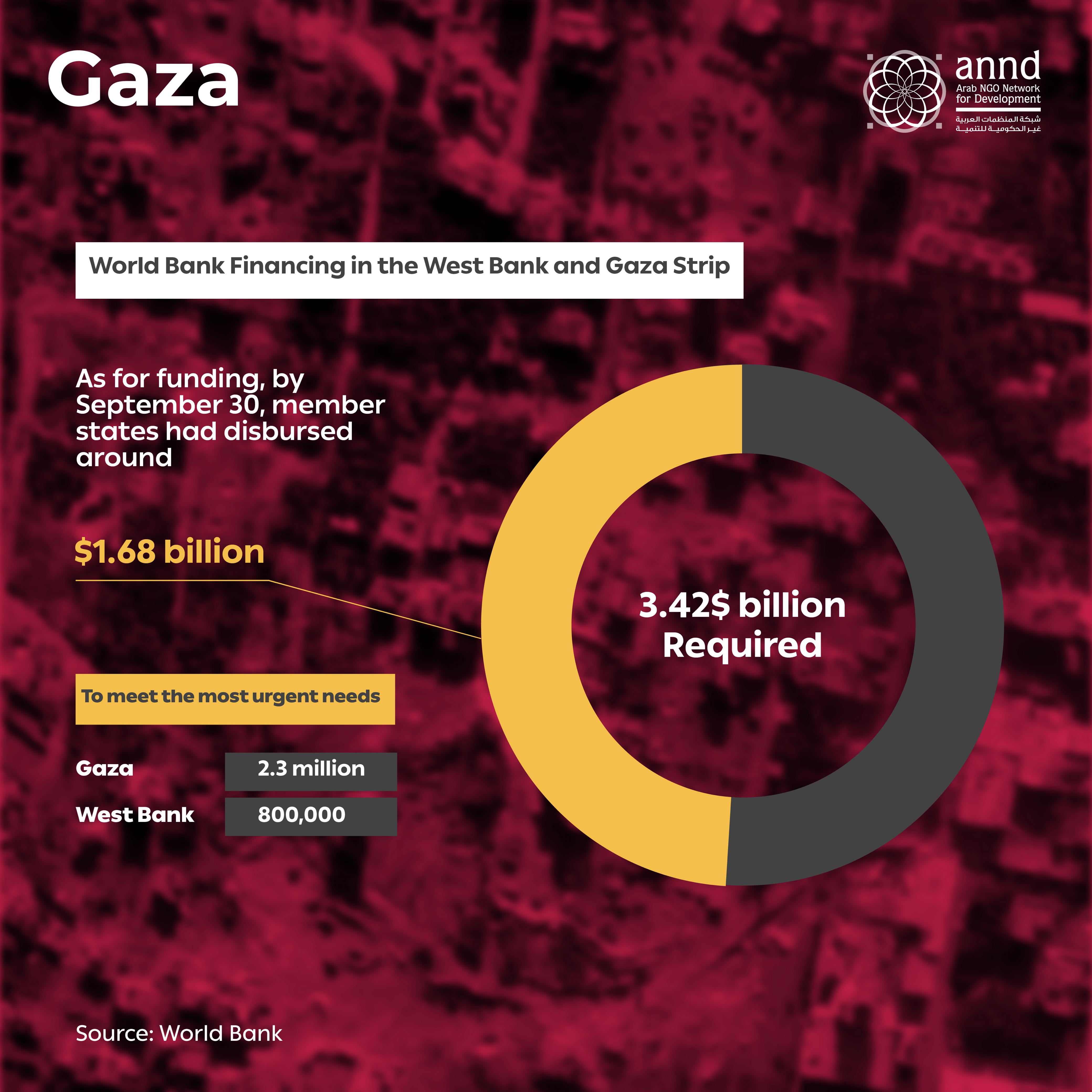
Developments After the Iranian Response
Iran denied any contact with the United States before the missile attack and warned the U.S. against intervening after Iran's missile strike on Israel, threatening to "strike all infrastructure" in Israel if Iran is attacked.
France, in turn, announced that it had "mobilized" its military capabilities in the Middle East to counter the Iranian threat and called for a UN Security Council meeting following the Iranian missile strike on Israel. French President Macron strongly condemned the Iranian attack on Israel.
German Interior Minister Nancy Faeser expressed shock at the scenes of celebrations in Berlin following the Iranian missile attack on Israel, reminding that any support for Hamas or Hezbollah is illegal under German law.
Recent publications

Neoliberalism and Feminist Discourse: Between Assimilation and Resistance in the Arab Context
